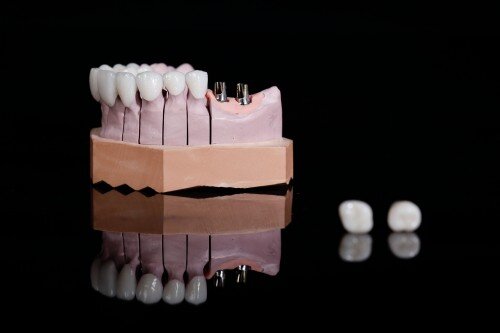As its name suggests, the primary task of a dental prosthesis is to replace a missing tooth (or teeth). If the tooth has already fallen out or is so badly damaged that it cannot remain in the mouth, then it can no longer carry out its required functions and the dental prosthesis must take over. This applies for activities such as chewing, speaking and enunciating.
Dental prostheses can be made from a range of materials: ceramic, composite materials, gold and many more. However, fully ceramic dental prostheses offer a number of advantages over other options.
Aesthetic Advantages:
 Ceramic is naturally white. This makes it the perfect base material for visually attractive dental prostheses that can be easily adapted by dental technicians to suit individual patients’ requirements. The shape and structure of a prosthesis can be rendered in such a way that it blends in well with any remaining natural teeth, while multiple layers of colour can be applied as part of a precise manual process that customizes the color to the patient’s needs. Particularly in the anterior region, ceramic also offers a slightly translucent appearance, enabling it to reflect light in much the same way as natural teeth. Ceramic lets us achieve aesthetically perfect results and put radiant smiles back on patients’ faces!
Ceramic is naturally white. This makes it the perfect base material for visually attractive dental prostheses that can be easily adapted by dental technicians to suit individual patients’ requirements. The shape and structure of a prosthesis can be rendered in such a way that it blends in well with any remaining natural teeth, while multiple layers of colour can be applied as part of a precise manual process that customizes the color to the patient’s needs. Particularly in the anterior region, ceramic also offers a slightly translucent appearance, enabling it to reflect light in much the same way as natural teeth. Ceramic lets us achieve aesthetically perfect results and put radiant smiles back on patients’ faces!
Quality:
Natural teeth are, in principle, designed for a lifetime of use. They can withstand high levels of chewing pressure and a wide range of temperatures without issues. They crush food and very rarely break under normal circumstances. Unfortunately, however, vulnerabilities do exist: teeth can succumb to cavities or other diseases. To enable them to withstand the pressures placed on natural teeth, dental prostheses must be of high quality – that is, hard, resistant to bending, and able to cope with challenging temperature and pressure conditions. These are precisely the advantages that fully ceramic prostheses offer.*
Biocompatibility:
It is very important that the material used for dental prostheses is compatible with the human body and will not bring about unwanted side effects, such as allergies.
Ceramic has been used in medical prostheses for decades, with no reports of allergic reactions. There is also no risk of interaction between ceramic prostheses and any pre-existing metal prostheses the patient may have. Furthermore, ceramic prostheses are tissue-friendly, which means that the gum at the edge of the prosthesis will not recede as quickly as with other types of material.
Interested in having a fully ceramic dental prosthesis fitted? Get in touch with the specialists at Dentaprime Dental Clinic today!
*Chronic teeth grinders are the only group of patients advised to avoid fully ceramic prostheses


